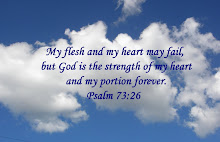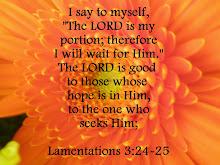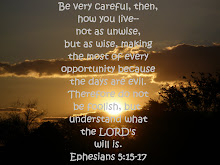March 1: Numbers 7
March 2: Numbers 8-10
March 3: Numbers 11-13
March 4: Numbers 14-15
March 5: Numbers 16-18
March 6: Numbers 19-21
March 7: Numbers 22-24
March 8: Numbers 25-26
March 9: Numbers 27-29
March 10: Numbers 30-31
March 11: Numbers 32-33
March 12: Numbers 34-36
March 13: Deuteronomy 1-2
March 14: Deuteronomy 3-4
March 15: Deuteronomy 5-7
March 16: Deuteronomy 8-10
March 17: Deuteronomy 11-13
March 18: Deuteronomy 14-17
March 19: Deuteronomy 18-21
March 20: Deuteronomy 22-25
March 21: Deuteronomy 26-28
March 22: Deuteronomy 29:1-31:29
March 23: Deuteronomy 31:30-34:12
March 24: Joshua 1-4
March 25: Joshua 5-8
March 26: Joshua 9-11
March 27: Joshua 12-14
March 28: Joshua 15-17
March 29: Joshua 18-19
March 30: Joshua 20-22
March 31: Joshua 23-Judges 1
Saturday, February 28, 2009
Sunday, February 22, 2009
living holy
This is one of those weeks where you wonder what on earth you might get out of the scriptures. And yet, if you continue to seek...there are gems here.
First, you have to understand that I have a unique sense of humor. So I was tickled to read that "All the fat is the Lord's" in Lev 3:16. Makes me feel a little better about storing fat for the winter.
Then there was the whole "scapegoat" thing. (The goat will carry on itself all their sins...The man who releases the goat as a scapegoat... Lev 16:20,26) I don't know if that's where the origin of the word came from but I felt kind of bad for the poor goat.
I also found it interesting that not only did Moses set up the entire Tabernacle (Ex 40) but that he was responsible for anointing the Tabernacle and everything in it and then Aaron and his sons too. (Lev. 8) When I first read the passages I considered it as a burden...but after thinking about it for a while, I've decided that it was an honor. A visible example of the relationship between Moses and God. Can you imagine God entrusting us with a task like that? My mind chants "I'm not worthy" over and over. And of course, I am not. Nor was Moses. Yet God didn't just use him, He chose him. Just as He continues to choose and use us today.
As I read through the remaining chapters, I was thinking about all the work that went into being God's people. It seemed to me that there were rules for everything. (and tell me honestly, did you wonder like I did if anyone was ever "clean"?) Then, I had a mini-epiphany. I realized that I was probably a lot more comfortable accepting all the rules and requirements that God put forth in order for me to be cleansed from my sin than I might be accepting the free gift of His Son. Does that make any sense? After all these years I still feel so unworthy of His grace and mercy. And of course I am. So I find myself trying to "pay" for it. Or feeling so unworthy that I am ashamed to call upon Him or turn to Him. Sigh. I wonder if that's what reading these chapters is really about. For me, anyway. Maybe He's trying to get me to look at Him in a different light.
The remaining verses serve as reminders to me. Too many times I forget whose I am and what I am supposed to be doing. My desire for this year is to be more focused on Him, to see His Word in new and marvelous ways, and to apply it to my life.
I am the Lord your God. Keep yourselves holy for me because I am holy. Leviticus 11:44
I am the Lord who brought you out of Egypt to be your God; you must be holy because I am holy. Leviticus 11:45
Press on...
First, you have to understand that I have a unique sense of humor. So I was tickled to read that "All the fat is the Lord's" in Lev 3:16. Makes me feel a little better about storing fat for the winter.
Then there was the whole "scapegoat" thing. (The goat will carry on itself all their sins...The man who releases the goat as a scapegoat... Lev 16:20,26) I don't know if that's where the origin of the word came from but I felt kind of bad for the poor goat.
I also found it interesting that not only did Moses set up the entire Tabernacle (Ex 40) but that he was responsible for anointing the Tabernacle and everything in it and then Aaron and his sons too. (Lev. 8) When I first read the passages I considered it as a burden...but after thinking about it for a while, I've decided that it was an honor. A visible example of the relationship between Moses and God. Can you imagine God entrusting us with a task like that? My mind chants "I'm not worthy" over and over. And of course, I am not. Nor was Moses. Yet God didn't just use him, He chose him. Just as He continues to choose and use us today.
As I read through the remaining chapters, I was thinking about all the work that went into being God's people. It seemed to me that there were rules for everything. (and tell me honestly, did you wonder like I did if anyone was ever "clean"?) Then, I had a mini-epiphany. I realized that I was probably a lot more comfortable accepting all the rules and requirements that God put forth in order for me to be cleansed from my sin than I might be accepting the free gift of His Son. Does that make any sense? After all these years I still feel so unworthy of His grace and mercy. And of course I am. So I find myself trying to "pay" for it. Or feeling so unworthy that I am ashamed to call upon Him or turn to Him. Sigh. I wonder if that's what reading these chapters is really about. For me, anyway. Maybe He's trying to get me to look at Him in a different light.
The remaining verses serve as reminders to me. Too many times I forget whose I am and what I am supposed to be doing. My desire for this year is to be more focused on Him, to see His Word in new and marvelous ways, and to apply it to my life.
I am the Lord your God. Keep yourselves holy for me because I am holy. Leviticus 11:44
I am the Lord who brought you out of Egypt to be your God; you must be holy because I am holy. Leviticus 11:45
Press on...
Thursday, February 19, 2009
wondering...
As I read our chapters yesterday, I came across this set of verses:
Moses slaughtered the ram and took some of its blood and put it on the lobe of Aaron's right ear, on the thumb of his right hand and on the big toe of his right foot. Moses also brought Aaron's sons forward and put some of the blood on the lobes of their right ears, on the thumbs of their right hands and on the big toes of their right feet. Then he sprinkled blood against the altar on all sides. Leviticus 8:23-24
After reading them, I couldn't help but wonder why on earth Moses would do such a thing. So I checked it out and this is what I found.
This act emphasized the role of the priestly office, with the blood stressing the ties to the sacrificial system. The priest's basic function was mediation between God and his people. To do this effectively, he needed ears that could hear the words of God and the needs of his people, hands ready to do God's bidding, and feet ready to take him where he was needed. (p207, NLT Study Bible.)
Curiosity satisfied.
This time.
Moses slaughtered the ram and took some of its blood and put it on the lobe of Aaron's right ear, on the thumb of his right hand and on the big toe of his right foot. Moses also brought Aaron's sons forward and put some of the blood on the lobes of their right ears, on the thumbs of their right hands and on the big toes of their right feet. Then he sprinkled blood against the altar on all sides. Leviticus 8:23-24
After reading them, I couldn't help but wonder why on earth Moses would do such a thing. So I checked it out and this is what I found.
This act emphasized the role of the priestly office, with the blood stressing the ties to the sacrificial system. The priest's basic function was mediation between God and his people. To do this effectively, he needed ears that could hear the words of God and the needs of his people, hands ready to do God's bidding, and feet ready to take him where he was needed. (p207, NLT Study Bible.)
Curiosity satisfied.
This time.
Tuesday, February 17, 2009
Leviticus
Can you believe we've finished three books already? (Of course, we could consider that we have 63 to go. But we won't.)
Here's some of the background information I have on Leviticus:
The NLT Study Bible says " Leviticus enabled ancient Israel to live in relationship with a holy God. But what do laws governing ancient Israel's system of worship, with its priests and animal sacrifices, have to do with us? Jesus Christ became our High Priest and ultimate sacrifice, thereby fulfilling many of these requirements. Yet Leviticus is important to us today because it increases our understanding of God's holiness. God's demand for those who know Him remains the same: 'I am the LORD your God...You must be holy because I am holy' (11:44-45; 1 Peter 1:15-16) " p192
My little book of fabulous information says: The key concept in Leviticus is holiness--being set apart for God's service and being different from the world by obeying God's commands.
When reading Leviticus, we should marvel at the intimacy of the use of God's names. Yahweh appears 311 times and all 52 occurrences of Elohim show the personal covenant relationship of God to His people: "your God" is used 40 times, "his God" is used 8 times, and "their God" is used 4 times.
Finally, Leviticus may be viewed as a book about atonement--the provision of access to God for sinful man. (14-15)
Can I get an amen on that? I have not thought of this book as a book of atonement. Hopefully, carrying this view in my head will help me with the more repetitive parts or the icky parts. (Like the "rip the head off the bird but not all the way" parts.)
Here's some of the background information I have on Leviticus:
The NLT Study Bible says " Leviticus enabled ancient Israel to live in relationship with a holy God. But what do laws governing ancient Israel's system of worship, with its priests and animal sacrifices, have to do with us? Jesus Christ became our High Priest and ultimate sacrifice, thereby fulfilling many of these requirements. Yet Leviticus is important to us today because it increases our understanding of God's holiness. God's demand for those who know Him remains the same: 'I am the LORD your God...You must be holy because I am holy' (11:44-45; 1 Peter 1:15-16) " p192
My little book of fabulous information says: The key concept in Leviticus is holiness--being set apart for God's service and being different from the world by obeying God's commands.
When reading Leviticus, we should marvel at the intimacy of the use of God's names. Yahweh appears 311 times and all 52 occurrences of Elohim show the personal covenant relationship of God to His people: "your God" is used 40 times, "his God" is used 8 times, and "their God" is used 4 times.
Finally, Leviticus may be viewed as a book about atonement--the provision of access to God for sinful man. (14-15)
Can I get an amen on that? I have not thought of this book as a book of atonement. Hopefully, carrying this view in my head will help me with the more repetitive parts or the icky parts. (Like the "rip the head off the bird but not all the way" parts.)
Sunday, February 15, 2009
irrelevant?
Calling all theological minds...anyone who has any scriptural background. There's something I need to know. Seriously...
He said to them, "This is what the Lord commanded: 'Tomorrow is to be a day of rest, a holy Sabbath to the LORD. Ex 16:23
Bear in mind that the LORD has given you the Sabbath; that is why on the sixth day He gives you bread for two days. Everyone is to stay where he is on the seventh day; no one is to go out. So the people rested on the seventh day. Ex 16:29-30
"Remember the Sabbath day by keeping it holy. Six days you shall labor and do all your work, but the seventh day is a Sabbath to the LORD your God. On it you shall not do any work, neither you, nor your son or daughter, nor your manservant or maidservant, nor your animals, nor the alien within your gates. For in six days the LORD made the heavens and the earth, the sea, and all that is in them, but he rested on the seventh day. Therefore the LORD blessed the Sabbath day and made it holy.
Ex 20:8-11
Then the LORD said to Moses, "Say to the Israelites, 'You must observe my Sabbaths. This will be a sign between me and you for the generations to come, so you may know that I am the LORD, who makes you holy. " 'Observe the Sabbath, because it is holy to you. Anyone who desecrates it must be put to death; whoever does any work on that day must be cut off from his people. For six days, work is to be done, but the seventh day is a Sabbath of rest, holy to the LORD. Whoever does any work on the Sabbath day must be put to death. The Israelites are to observe the Sabbath, celebrating it for the generations to come as a lasting covenant. It will be a sign between me and the Israelites forever, for in six days the LORD made the heavens and the earth, and on the seventh day he abstained from work and rested.'" Ex 31:12-17
For six days, work is to be done, but the seventh day shall be your holy day, a Sabbath of rest to the LORD. Whoever does any work on it must be put to death.
Ex 35:2
Are these scriptures irrelevant? Are we allowed to pick and choose scriptures that we prefer? Do we get to choose the ones that seem like they are easy or don't interfere with our lifestyles? (although after completing Kelly Minter's No Other Gods study last summer, it would seem that keeping the Sabbath might be one of the easier commandments to keep.)
Does anybody have anything to offer on this subject? I can promise you that these are not the only scriptures we will read concerning the Sabbath this year.
He said to them, "This is what the Lord commanded: 'Tomorrow is to be a day of rest, a holy Sabbath to the LORD. Ex 16:23
Bear in mind that the LORD has given you the Sabbath; that is why on the sixth day He gives you bread for two days. Everyone is to stay where he is on the seventh day; no one is to go out. So the people rested on the seventh day. Ex 16:29-30
"Remember the Sabbath day by keeping it holy. Six days you shall labor and do all your work, but the seventh day is a Sabbath to the LORD your God. On it you shall not do any work, neither you, nor your son or daughter, nor your manservant or maidservant, nor your animals, nor the alien within your gates. For in six days the LORD made the heavens and the earth, the sea, and all that is in them, but he rested on the seventh day. Therefore the LORD blessed the Sabbath day and made it holy.
Ex 20:8-11
Then the LORD said to Moses, "Say to the Israelites, 'You must observe my Sabbaths. This will be a sign between me and you for the generations to come, so you may know that I am the LORD, who makes you holy. " 'Observe the Sabbath, because it is holy to you. Anyone who desecrates it must be put to death; whoever does any work on that day must be cut off from his people. For six days, work is to be done, but the seventh day is a Sabbath of rest, holy to the LORD. Whoever does any work on the Sabbath day must be put to death. The Israelites are to observe the Sabbath, celebrating it for the generations to come as a lasting covenant. It will be a sign between me and the Israelites forever, for in six days the LORD made the heavens and the earth, and on the seventh day he abstained from work and rested.'" Ex 31:12-17
For six days, work is to be done, but the seventh day shall be your holy day, a Sabbath of rest to the LORD. Whoever does any work on it must be put to death.
Ex 35:2
Are these scriptures irrelevant? Are we allowed to pick and choose scriptures that we prefer? Do we get to choose the ones that seem like they are easy or don't interfere with our lifestyles? (although after completing Kelly Minter's No Other Gods study last summer, it would seem that keeping the Sabbath might be one of the easier commandments to keep.)
Does anybody have anything to offer on this subject? I can promise you that these are not the only scriptures we will read concerning the Sabbath this year.
Saturday, February 14, 2009
Glory

When you make the offering, I, the Lord, will meet you there and speak to you. I will meet with the people of Israel there, and that place will be holy because of my glory. Exodus 29:42-43 NCV
For years I have pondered the concept of God's glory. Through scripture and song, I have puzzled over it's meaning. Recently I came across an article in the NLT Study Bible that put things into a better perspective. Here's an excerpt:
Glory has a rather different connotation in the Old Testament than it does in the English usage. The English word suggests something thin and passing--the glory of a sunset, the glory of last year's winning team. The root idea of the Hebrew word for glory is "heaviness" or "solidity." It connotes "significance" or "worth," the absolute opposite of "vanity" or "nothingness." When God's glory appears, it is not merely a bright light or a glittering cloud, but a visible expression of His absolute reality.
God's glory is the manifestation of His person, His power, and His majesty. God's glory may be revealed in nature, such as in a thunderstorm or in the plagues sent on the Egyptians. God's glory can also be a unique manifestation, such as the revelation on Mount Sinai. At the dedication of the Tabernacle and Solomon's Temple, God's glory filled those structures indicating His approval of them and that His presence would now reside there.
To give glory to God means to speak or act in a manner that acknowledges who God is. (167)
I have given a lot of thought lately about whether or not my life reflects what I purport to believe, particularly in this day and age. It would be terribly easy to walk through each day paralyzed with a spirit of fear. However, if I truly believe that God is sovereign, my life needs to reflect that. I suspect that my days would be better served learning to give glory to God in all my circumstances.
Be cheerful no matter what; pray all the time; thank God no matter what happens. This is the way God wants you who belong to Christ Jesus to live. 1 Thess 5:16-18
Be cheerful no matter what; pray all the time; thank God no matter what happens. This is the way God wants you who belong to Christ Jesus to live. 1 Thess 5:16-18
Thursday, February 12, 2009
Treasured...
I appreciate each one of your prayers on our behalf as we once again battle some ridiculous illness. (one of the questions I'll have on my list when I arrive in heaven will be what purpose viruses serve. Because surely they must serve a purpose.)
One thing that I am trying to do differently this year as I read through my bible is to check more background and reference material. I want to try and see things from every angle. I don't want to miss a thing. (working in a christian book store makes it a lot easier to get my hands on all kinds of material. Woo hoo!) I recently checked out the Holman Old Testament Commentaries and I am absolutely thrilled with the material that they provide. They are set up like a Sunday school lesson with illustrations, breakdowns of the text, summaries and so forth. I think I'll be adding them to my list of "must haves."
Max Anders says that Exodus is a redemption story. Not just the story of the Israelites making an "exodus" from Egypt, but a picture of a loving God hastening to save His chosen people. This appeals to me on so many levels. As a person with "issues", nothing thrills my heart more than when scripture uses words like "treasured possession, delighted, chosen." Words like these add balm to a heart that has been hurt more times than I would care to count. I hold scripture like Neither the pillar of cloud by day nor the pillar of fire by night left it's place in front of the people (13:22) and how I carried you on eagles' wings and brought you to myself...if you obey me fully and keep my covenant, then out of all nations you will be my treasured possession (19:4) close to me. It brings me such comfort on difficult, complicated days. (and it brings a smile to my face on the rather ordinary days as well.)
I hope you know how God sees you. I pray that you realize that you too are His treasured possession. How He loves each one of us! I encourage you to keep reading. I know that we have some...um...interesting passages ahead of us as we listen to descriptions of cubits, curtains, and rings.
One thing that I am trying to do differently this year as I read through my bible is to check more background and reference material. I want to try and see things from every angle. I don't want to miss a thing. (working in a christian book store makes it a lot easier to get my hands on all kinds of material. Woo hoo!) I recently checked out the Holman Old Testament Commentaries and I am absolutely thrilled with the material that they provide. They are set up like a Sunday school lesson with illustrations, breakdowns of the text, summaries and so forth. I think I'll be adding them to my list of "must haves."
Max Anders says that Exodus is a redemption story. Not just the story of the Israelites making an "exodus" from Egypt, but a picture of a loving God hastening to save His chosen people. This appeals to me on so many levels. As a person with "issues", nothing thrills my heart more than when scripture uses words like "treasured possession, delighted, chosen." Words like these add balm to a heart that has been hurt more times than I would care to count. I hold scripture like Neither the pillar of cloud by day nor the pillar of fire by night left it's place in front of the people (13:22) and how I carried you on eagles' wings and brought you to myself...if you obey me fully and keep my covenant, then out of all nations you will be my treasured possession (19:4) close to me. It brings me such comfort on difficult, complicated days. (and it brings a smile to my face on the rather ordinary days as well.)
I hope you know how God sees you. I pray that you realize that you too are His treasured possession. How He loves each one of us! I encourage you to keep reading. I know that we have some...um...interesting passages ahead of us as we listen to descriptions of cubits, curtains, and rings.
***
I am taking a few days off work to a) begin planning my daughter's wedding (we are wedding dress shopping today) and b) celebrate our 22nd wedding anniversary on Valentine's Day. I am planning on catching up on your posts these next few days as well. If you have a moment or two to spare, please remember our city in your prayers. We finally got every one's power back on from the ice storm only to have a wind storm sweep through and bring down more trees and power lines. Sigh. We like the dark. It encourages napping.
Wednesday, February 11, 2009
what happened?
I apologize for not having my recap post up. Um...and this is not it either. I'll give you a hint as to why. One verse that caught my eye (and my head) this week was "for I am the Lord, who heals you." (Ex 15:26) I am grateful that He is. (I also wish He would allow people with germs and contagious illnesses to glow a particular color so we would know them when we see them. And as an added bonus, it would be nice if the germs that they leave behind when they touch phones, TV remotes, door knobs, etc, would glow as well. So that some poor unsuspecting person wouldn't pick up the aforementioned germs and spread them all around to his or her family.)
As you might have guessed, three out of four of us have been dealing with some form of the dreaded "stomach virus." And while we are recovering from this inconvenience, the effects of it are not particularly conducive to deep thoughts about the Word. With that said, I am planning on posting my recap tonight or tomorrow.
I hope all is well (and healthy) with you. (don't forget to wash your hands!)
As you might have guessed, three out of four of us have been dealing with some form of the dreaded "stomach virus." And while we are recovering from this inconvenience, the effects of it are not particularly conducive to deep thoughts about the Word. With that said, I am planning on posting my recap tonight or tomorrow.
I hope all is well (and healthy) with you. (don't forget to wash your hands!)
Sunday, February 1, 2009
Job 20-42, Exodus 1-4

Each week, as I read, I mark different verses in my Bible and then stick a sticky note on the page so that when I do the recap, they are easier to find. By weeks end, I look like I have a little rainbow along the edges of my Bible. I like the reminder that I am delving into the Word and that these pages spoke to me in some way.
This week I have the same number of sticky notes that I usually do. But I'm not sure what to do with them. I don't want this to become the "endless" post, with so much information that it becomes distracting. So, I am going to choose the one section that has been lingering in my mind for the past few days. I may go back and touch on a few other things this week but this particular section of scripture has captured my imagination.
Five weeks ago we started our reading with "in the beginning." We saw God create light, darkness, earth, sky, the seas, dry land and so forth. And to be perfectly honest, while the wording was concise and not terribly detailed, it was enough.
Because it was what I expected. The creation story was, is and always will be this way.
Until this week.
Until God spoke.
And let me tell you, His words spoke to the poet in my soul. Did you see the creation story in Job 38?
Where were you when I made the earth's foundation?
Tell me, if you understand.
Who marked off how big it should be? Surely you know!
Who stretched a ruler across it?
What were the earth's foundations set on,
or who put its cornerstone in place
while the morning stars sang together
and all the angels shouted with joy?
"Who shut the doors to keep the sea in
when it broke through and was born,
when I made the clouds like a coat for the sea
and wrapped it in dark clouds,
when I put limits on the sea
and put its doors and bars in place,
when I said to the sea, 'You may come this far, but no farther;
this is where your proud waves must stop'?
"Have you ever ordered the morning to begin,
or shown the dawn where its place was
in order to take hold of the earth by its edges
and shake evil people out of it?
At dawn the earth changes like clay being pressed by a seal;
the hills and valleys stand out like folds in a coat.
Job 38:4-14
For someone like me, someone who absorbs the printed word like it's her very lifeblood, someone who thinks in word pictures, this passage is a beautifully crafted story of "in the beginning." And I am delighted to find it here. The morning stars sang, the angels shouted for joy, clouds like a coat for the sea...I am so in awe of my God. He delights me. Once again, I found treasure in a place that I least expected it. Although, after all that I have learned of my God, I should not be surprised.
So tell me, how has God delighted you this week?
Exodus
My wonderful little book of knowledge gives us this information about the book of Exodus:
The theme of Exodus is the deliverance of the Israelites from Egypt, in fulfillment of the promise made by God in Genesis 15:13-14. The book records the birth of the nation of Israel, the giving of the law, and the origin of ritual worship.
Exodus begins where Genesis left off; with the relocation of Jacob and his descendants to Egypt, in fulfillment of Genesis 15:13a. But in fulfillment of Genesis 15:13b, the Israelites are soon enslaved and oppressed by the Egyptians. The rest of the book begins to fulfill Genesis 15:14, 16--the exodus from Egypt to the Promised Land. The majority of Exodus concentrates on the eighty-one years between the birth of Moses and the setting up of the tabernacle.
The name Yahweh first appears in chapter 3. God proclaims that He has "come down"--that He is specially present on Earth to deliver His people from bondage and lead them into the bountiful land of promise.
Israel breaks the first two commandments when the people build the golden calf and worship it as their god. Though God responds with judgement, He still reveals His character as Yahweh, the compassionate and gracious God who forgives the repentant but judges the unrepentant. This compassion is one of the most important revelations about the character of Yahweh, and is repeated throughout scripture until it culminates the the coming of Jesus in John 1:14. (p.13-14)
This is one of the reasons that I love reading the Bible chronologically. As we read, we see how God has "progressively revealed Himself in word and action" throughout history. Good stuff!
The theme of Exodus is the deliverance of the Israelites from Egypt, in fulfillment of the promise made by God in Genesis 15:13-14. The book records the birth of the nation of Israel, the giving of the law, and the origin of ritual worship.
Exodus begins where Genesis left off; with the relocation of Jacob and his descendants to Egypt, in fulfillment of Genesis 15:13a. But in fulfillment of Genesis 15:13b, the Israelites are soon enslaved and oppressed by the Egyptians. The rest of the book begins to fulfill Genesis 15:14, 16--the exodus from Egypt to the Promised Land. The majority of Exodus concentrates on the eighty-one years between the birth of Moses and the setting up of the tabernacle.
The name Yahweh first appears in chapter 3. God proclaims that He has "come down"--that He is specially present on Earth to deliver His people from bondage and lead them into the bountiful land of promise.
Israel breaks the first two commandments when the people build the golden calf and worship it as their god. Though God responds with judgement, He still reveals His character as Yahweh, the compassionate and gracious God who forgives the repentant but judges the unrepentant. This compassion is one of the most important revelations about the character of Yahweh, and is repeated throughout scripture until it culminates the the coming of Jesus in John 1:14. (p.13-14)
This is one of the reasons that I love reading the Bible chronologically. As we read, we see how God has "progressively revealed Himself in word and action" throughout history. Good stuff!
Subscribe to:
Posts (Atom)












